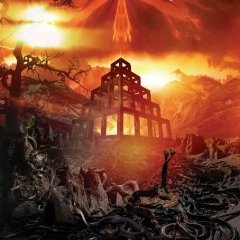In certain musical circles, the four members of Shrinebuilder are already demigods, having proven themselves throughout decades of creating groundbreaking music. When they announced earlier this year that they were coming together to record an album as a new band, it was hard to think of four experienced musicians who could be better suited for one another. Despite the differences between their musical pasts (and there are many), they seem united by a communal spirit of experimental, meditative heaviness.
The biggest question leading up to the release of their self-titled debut earlier this month wasn’t whether it would be worthy, but how it would sound. Would the sum of these titans be unprecedented, the likes of which we’ve never heard before? Or would it showcase the flexing of well-practiced musical muscles?
Either result would have awed some fans and alienated others, but we finally know the answer: it rocks in exactly the way you’d expect, playing out like a best-practices manual for contemporary doom metal. The riffs are monolithic in their primordial simplicity; songs progress glacially, with the momentum of tectonic plates. Pummeling beats support psychedelic, semi-spiritual imagery. Shrinebuilder doesn’t try to explore new territory, but it captures its players doing what they do best.
It’s all here: the harmonized, melodic leads of Scott "Wino" Weinrich (guitar, the Obsessed, Spirit Caravan, the Hidden Hand, et. al.), the understated aggression of Scott Kelly (guitar, Neurosis, Blood & Time), the low-end monotony of Al Cisneros (bass, Sleep, Om), the two-ton polyrhythmic violence of Dale Crover (drums, Melvins, Altamont). You can almost pick out the parts of each track that bear their signatures. The opening salvo of ‘Solar Benediction’ sounds like it could have been lifted straight from the Melvins’ ‘The Talking Horse’, while ‘Pyramid of the Moon’ can be neatly distilled into the Blood and Time and Om sections. Wino, Kelly and Cisneros rotate as lead vocalist, and the parts they helm take on the character of their respective bands.
This isn’t necessarily a bad thing. It’s the sound of four masters working together with deft, practiced strokes. For metal aficionados, it’s as if the Renaissance’s brightest luminaries had banded together at the height of their careers to erect a massive… well, shrine. As a monument to the down-tuned riff, there are few better-sounding examples.
It could be argued that given that the constituent members of Shrinebuilder helped define the genres in which they operate, it’s hard to consider this music without comparing it to that past work. It’s even harder when the music itself invites a sort of name-the-influence drinking game. If the album had come out of nowhere, recorded by unknowns, would it have been hailed as revelatory, or chastised as derivative? More likely the latter — but to be fair, these plaigiarists wrote the book to begin with.
Shrinebuilder is mostly a showcasing of preeminent talents. Like a virtuosic portfolio assembled to dazzle prospective patrons, its greatest accomplishment will probably be to inspire new fans to discover its members’ other work. Unlike a group of rising stars, Shrinebuilder faces a future battle for continued relevance against its own past.
None of this implies that the group isn’t up to the challenge. It does, however, beg a question: Shrinebuilder may not be revolutionary, but can we expect every work by such veterans to bear such aspirations? Can we fault Shrinebuilder for not redefining our universe in the same way that Wino, Kelly, Cisneros and Crover did before we knew what to expect from them? Is it possible for a supergroup like this one to truly step out of its predecessors’ long shadows? Time will tell in Shrinebuilder’s case. But it doesn’t hurt that their debut sounds so satisfying on a primal level.


